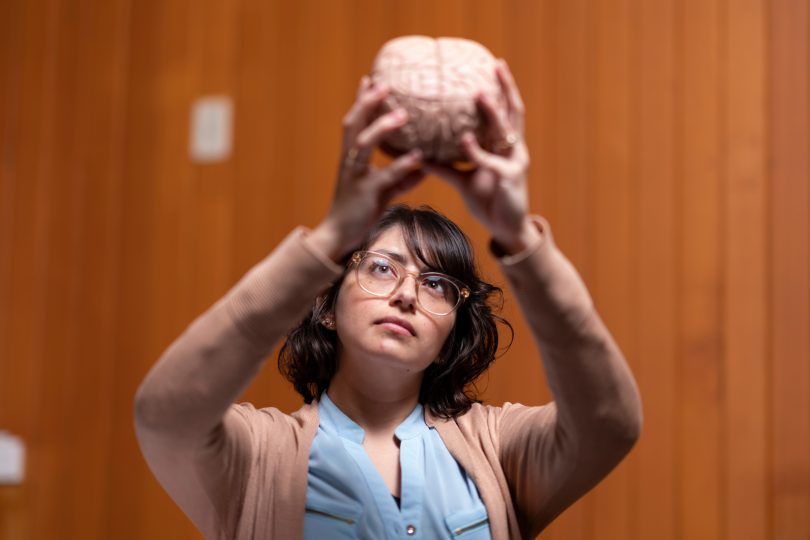
PhD candidate Daniela Espinoza Oyarce inspects a human brain model at the ANU Research School of Population Health. Photos: Supplied, ANU.
You may want to think twice next time you say someone is ‘big-headed’.
Researchers at the Australian National University (ANU) have found depression is linked to areas of the brain shrinking in size, but when depression is paired with anxiety, one area of the brain becomes significantly larger.
Lead researcher and PhD candidate Ms Daniela Espinoza Oyarce said their study, published in The Journal of Psychiatry and Neuroscience, looked at 11,000 people to find the effects of depression and anxiety on brain volume.
“Anxiety lowers the effect of depression on brain volume sizes by three per cent on average, somewhat hiding the true shrinking effects of depression,” Ms Espinoza Oyarce said.
Ms Espinoza Oyarce and three other researchers also put their own minds into more than 110 studies on the subject that will help scientists learn about the brain and the body’s reaction to depression and anxiety.

“Early treatment will also help protect areas of the brain that are affected,” says PhD candidate Daniela Espinoza Oyarce.
The study showed depression has a pronounced shrinking impact on the hippocampus, the part of the brain linked to memory and learning.
In contrast, the study found that when depression and anxiety occur together, it leads to an increase in the part of the brain called the amygdala, which is linked to emotions like fear and anxiety.
“Many studies looking at the effect of depression on the brain do not account for the fact that people who have depression often experience anxiety too,” Ms Espinoza Oyarce said.
“A lot of people tend to think that if you are experiencing depression or anxiety, it is all in your head. There are other elements that affect people such as having trouble sleeping or eating, so we can link it to the part of the brain that regulates sleep or appetite.”
Depression is the most debilitating disorder worldwide, and one-in-six Australians currently experience depression, anxiety, or both.
“We found people who have depression alone have lower brain volumes in many areas of the brain, and in particular the hippocampus,” Ms Espinoza Oyarce said.
“This becomes even more relevant later in life because a smaller hippocampus is a risk factor for Alzheimer’s disease and may accelerate the development of dementia.”
Ms Espinoza Oyarce said a particularly important finding of this research is that people with both depression and anxiety had less shrinkage in many brain areas and even an increase in the amygdala. This indicates that the true effect of depression on the brain has been underestimated because of an opposite effect in the amygdala.
She said by comparing people who have been diagnosed with depression or an anxiety disorder to those without any sign of mental illness will help improve the treatment of people who find it difficult to get relief from their medication.
Some people may go years before they find the right treatment, while others with less severe symptoms of depression or anxiety are able to control the impact exercise or mindfulness practices such as yoga or meditation.
While the study didn’t look at different treatment methods, Ms Espinoza Oyarce said it is now well known that exercise protects the hippocampus, regardless of whether someone is suffering from a mental illness.
“But when someone is going through a depressive episode, we know how hard it can be for someone to get out of the house and exercise, but at the same time, you don’t have to have a mental illness to see the benefits of exercise,” Ms Espinoza Oyarce said.
“We also noticed that people who are suffering from multiple episodes of depression had worse outcomes than people who were experiencing their first episode, so the longer you have had a depressive episode that hasn’t been managed properly, the worse it is for your brain.
“We do know that early treatment will also help protect areas of the brain that are affected.
“I would like to say that this is a reversible effect in the brain, but at the moment, more research is needed into how anxiety lowers the effects of depression, but for the amygdala, perhaps anxiety leads to overactivity.”
Ms Espinoza Oyarce said the research will give us more clues as to what is happening in the brain when someone is suffering from anxiety or depression.
“I would like people to understand that this is something that is quite prevalent, so I hope that by showing people what happens in the brain, it will create more awareness – that it’s not all in your head and is associated with changes in your brain, and you should do something about it.”
















